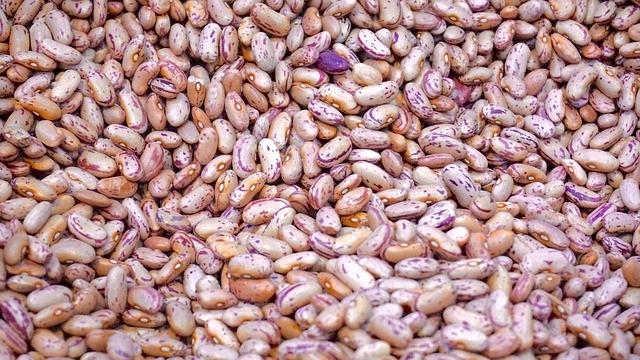

Image: Pixabay*
Produced by a startup supported by FAPESP, the bean protein concentrate is designed to appeal to flexitarians – consumers who want to increase their intake of plant-based foods and decrease that of animal products.
Produced by a startup supported by FAPESP, the bean protein concentrate is designed to appeal to flexitarians – consumers who want to increase their intake of plant-based foods and decrease that of animal products.

Image: Pixabay*
By Roseli Andrion | Agência FAPESP – Proteins are present in all kinds of food, but their levels are highest in animal products, such as eggs, beef, chicken, pork, fish and cheese, among others. Vegans and people interested in reducing their intake of animal foods, such as flexitarians (semi-vegetarians), need to pursue a specific strategy to obtain sufficient protein from their meals.
To target this segment, researchers at ProVerde, a startup based in Campinas (São Paulo state, Brazil), have developed a bean protein concentrate with a sustainable technique that does not use water. They were supported by FAPESP’s Innovative Research in Small Business Program (PIPE). The idea was thought up by food engineer Paula Speranza, founder of the firm, which develops plant-based ingredients via bioprocesses.
Having succeeded in producing a protein concentrate from common beans (Phaseolus vulgaris), Speranza subjected it to a fermentation process. “We took five varieties of the beans and selected those with the best properties for development of the product. We also included certain microorganisms in the concentrates to optimize their characteristics,” she says.
The protein concentrates have a somewhat unpleasant aftertaste. “Fermentation aims to mitigate this drawback as well as other traits, such as the difficulty of dissolving the substance and of producing foam. In other words, the idea was to improve the flavor, aroma and functional properties of the concentrate without altering its fundamental properties as a food supplement,” she explains.
Fermentation is an ancient technique that optimizes these aspects. “This type of process has been increasingly applied to plant-based protein in recent years. It‘s frequently used in other countries to enhance this ingredient,” she says. Perhaps for this reason, in addition to the investment received from FAPESP, ProVerde has been approved for inclusion in an international funding program by the Good Food Institute (GFI).
According to Speranza, the product’s differentiator is precisely fermentation. “In Brazil, we have carioca bean concentrate but it isn’t fermented. Our project aims to produce a plant-based protein concentrate from a local plant source available here in Brazil. The purpose of the fermentation is to optimize its properties,” she says.
Protein concentrates are widely used by the food industry for inclusion in plant-based products, but this is not their only use. “Many products are enriched with protein, such as pasta, snacks for athletes, yoghurt, and so on. It’s as if ProVerde’s concentrate were a competitor of whey protein but obtained from a vegetable source. We’re aiming at good functionality like that of whey to satisfy demand for plant-based protein,” she says
All year long
Protein concentrates from chickpeas and green peas can be imported to Brazil, but they are expensive. “It’s cheaper for us to make the product from common beans because the supply of this legume is abundant,” Speranza notes. As local produce, it can be used by the food industry to avoid dependence on imported raw materials.
The variety chosen by the startup for protein concentrate production is available all year long, not least because it is grown in almost all regions of this vast country and is always being harvested somewhere.
The market for vegan food products is steadily growing, albeit slowly in Brazil at this time. However, the ingredient is not aimed only at vegan consumers. “Athletes and people who like to keep fit also use the product,” Speranza recalls. “Moreover, demand for plant-based protein as a substitute for animal protein is increasing thanks to the rising numbers of flexitarians, a segment that’s expanding much more than the vegan segment.”
Flexitarians differ from vegans insofar as they prefer vegetable protein products to be as similar as possible to animal protein products. “Vegans don’t want a beef analog, for example, whereas flexitarians are keen on plant-based products that resemble animal products. We aim to meet this demand,” she says.
She originally decided to target this segment in order to take the opportunity offered by its growth, and also because she was attracted to the market for sustainably-produced health foods.
“The product has potential: demand for it already exists. I myself consume this kind of food because I’m a flexitarian. I also appreciate the fact that the project helps foster conscious consumption and has a positive socioenvironmental impact,” she says.
* Image from Pexels on Pixabay
Republish
The Agency FAPESP licenses news via Creative Commons (CC-BY-NC-ND) so that they can be republished free of charge and in a simple way by other digital or printed vehicles. Agência FAPESP must be credited as the source of the content being republished and the name of the reporter (if any) must be attributed. Using the HMTL button below allows compliance with these rules, detailed in Digital Republishing Policy FAPESP.





